- Home
- Cary Fagan
The Collected Works of Gretchen Oyster
The Collected Works of Gretchen Oyster Read online
Also by Cary Fagan
The Fortress of Kaspar Snit
Directed by Kaspar Snit
Ten Lessons for Kaspar Snit
Jacob Two-Two on the High Seas
The Boy in the Box
The Show To End All Shows
Mort Ziff Is Not Dead
Wolfie & Fly
Wolfie & Fly: Band on the Run
Text copyright © 2019 by Cary Fagan
Interior illustrations © 2019 by Cary Fagan
Cover illustrations © 2019 by Felicita Sala
Brain image on this page from Jolygon/Shutterstock.com. Image of dog on this page courtesy of Sydney the dog. Hand image on this page from GenViewFinder/Shutterstock.com. Used under licence.
Tundra Books, an imprint of Penguin Random House Canada Young Readers, a Penguin Random House Company
All rights reserved. The use of any part of this publication reproduced, transmitted in any form or by any means, electronic, mechanical, photocopying, recording, or otherwise, or stored in a retrieval system, without the prior written consent of the publisher – or, in case of photocopying or other reprographic copying, a licence from the Canadian Copyright Licensing Agency – is an infringement of the copyright law.
Library and Archives Canada Cataloguing in Publication
Fagan, Cary, author
The collected works of Gretchen Oyster / Cary Fagan.
Issued in print and electronic formats.
Collected works of Gretchen Oyster.
ISBN 978-0-7352-6621-6 (hardcover).–ISBN 978-0-7352-6622-3 (EPUB)
I. Title.
PS8561.A375C65 2019 jC813′.54 C2018-905949-4
C2018-905950-8
Published simultaneously in the United States of America by Tundra Books of Northern New York, an imprint of Penguin Random House Canada Young Readers, a Penguin Random House Company
Library of Congress Control Number: 2018961233
Edited by Lynne Missen and Peter Phillips
Ebook design adapted from printed book design by John Martz
The artwork in this book was made from paper cutouts, old illustrations, photographs, rubber stamps, and a trusty glue-stick.
www.penguinrandomhouse.ca
v5.3.2
a
For Rachel, Sophie, Elena, and Yoyo,
–my creative bunch
Acknowledgments
Warm and fulsome thanks to Lynne Missen and Tara Walker; your support and friendship mean so much to me. Peter Phillips made many perceptive and useful comments. Thank you, John Martz, for the beautiful design. Shana Hayes cleaned up my copy. Finally, a collective hug to everyone at Tundra Books and Penguin Random House Canada.
Contents
Cover
Also by Cary Fagan
Title Page
Copyright
Dedication
Acknowledgments
1: The Place Where Books Go to Die
2: The Drawer
3: The Big One
4: Former Best Friend
5: The Excitement of Grocery Shopping
6: Office Supplies for Fun and Profit
7: g.o.
8: The Mr. Successful Detective Agency
9: Leaning Bear
10: g.o.
11: The Metal Box
12: Get Out of Jail Free
13: Hello, Cheese
14: The Room
15: Not Good Enough
16: The Quick Stop
17: Doom
18: g.o.
19: Pow Pow
20: Cat Paintings
21: The Curveball
22: Now or Never
23: Almond Avenue
24: A Little Delay
25: Tall
26: Bedside
27: Wishful Thinking
28: g.o.
29: Orange
1
The Place Where Books Go to Die
My teacher Ms. Gorham once said that a story should have an exciting opening. Like this—
We stood and watched as the entire laboratory went up in flames.
Or maybe—
If there was one thing I couldn’t do, it was sit idly by while a bunch of giant insects tried to eat their way across the planet.
Unfortunately, this is not that kind of opening.
I went to the library.
I went because it was Saturday and nobody was paying me the slightest attention. Not my mother or my father or my older sister or even my little brother for that matter. And certainly not my older brother, Jackson.
That last sentence was sort of a trick. Because Jackson had run away from home. Nine months ago now. I had thought about not revealing this fact for a while, sort of keeping it up my sleeve to reveal in a more dramatic way—ta da!—but I hate when stories do that. Nope, my brother ran away and we didn’t have the slightest idea where he was.
This should tell you a lot about why everyone was paying me no attention.
Now, back to the library.
Oh, wait. Before I tell you what happened in the library, I better introduce myself.
A lot of stories have a main character with a really memorable name. Like Scout. Or Katniss Everdeen. Or Matilda Wormwood. Me, not so much. I’m Hartley. Hartley Joshua Staples. And no, my family doesn’t own the chain of Staples office supply stores. We aren’t rich. We’re middle-class. Or as my dad likes to say, we’re solidly middle-class. I’m not sure why he thinks that sounds better.
You probably expect me to tell you all kinds of stuff about myself: what kind of music I stream, or problems I’m having at school, or maybe that I like some girl with long hair who sits in front of me in math class.
Can we be mature, people?
Now back to the library.
The Whirton Public Library is the size of a mobile home. That’s because it was a mobile home, once upon a time. The original library was in the basement of the town hall, but then the basement got flooded in what I like to call the Great Downpour of 2017, and all the books got ruined, and the town decided that maybe the basement wasn’t the best place for it.
The problem was that the town had no money to build a proper library out of actual bricks. This is where George Smythe comes in.
You might think that, at this advanced stage of human evolution, we would have done away with the town eccentric. Not so. In fact, our town has more than its share. George Smythe is a retired mail carrier turned inventor. He believed that it was possible for anybody to build a rocket ship that was better and cheaper than anything the Americans, Russians, or Chinese could make. So George sold off everything he owned, including his house, in order to buy parts for his rocket ship. He moved into an old mobile home on a vacant lot.
George really did build a rocket ship. It looked suspiciously like a grain silo with a ring of oil drums around the bottom of it and a nose made out of welded car doors. Now, the town councillors were all for putting our town on the map, but not so that the world could laugh at us. They held an emergency meeting to decide how they could stop George Smythe from trying to fire his rocket. But George got wind of the meeting. And that night he lit the fuse.
Yes, the Smythe Galaxy One had an actual fuse, like a firecracker.
And that’s how it behaved.
Instead of going up, the nose blew off, and the
most spectacular display of fireworks shot out of it.
Then it exploded.
George got knocked backward. Falling sparks caused a nearby wooden fence and a chicken coop to burn down. For a month, the town smelled like fried chicken.
The police charged George with causing a public danger or something like that, but he agreed to move in with his sister and behave himself, so they just fined him. For a while he refused to pay, but finally he agreed to give the town his mobile home since he didn’t need it anymore.
You get the rest. The town moved the home beside the fire hall and turned it into the library, otherwise known as the Place Where Books Go to Die.
The town of Whirton doesn’t seem to consider reading to be of much value. And so the annual budget for the library is…zero. Which means that all the books are donated by people who don’t want them anymore. There is a big paperback romance section. A whole wall of true crime. An almost complete set of a magazine called Funeral Service Monthly.
Not a single book by Charles Dickens, J. K. Rowling, or Bill Shakespeare.
But it was Saturday and I had nothing better to do, so I walked over from our house. As I stepped inside, a voice called to me from the back office. The back office used to be George Smythe’s bedroom.
“Ricky Stackhouse, is that you?”
“No, it’s not, Mrs. Scheer.”
“Because if that’s Ricky Stackhouse, you have an overdue book on beekeeping.”
“It’s Hartley Staples.”
Mrs. Scheer appeared in the office doorway, no doubt wanting to make sure that I wasn’t Ricky Stackhouse pretending to be Hartley Staples. She had glasses hanging on a string around her neck, even though the world’s librarians had voted to stop doing that because everyone made fun of them. Mrs. Scheer was the last holdout.
“Are you sure?” she said. “You look an awful lot like Ricky.”
“He has red hair. And he’s about six inches taller than me.”
“Well, when you see Ricky Stackhouse, tell him that’s our only book on beekeeping and we need it back.”
“Sure. Do you mind if I browse around first?”
“Be my guest. Mr. Andrushko just gave us a new box of books. Do you happen to read Ukrainian?”
I said no and Mrs. Scheer shook her head, as if to say, Just what are they teaching in our schools nowadays? Given that the library had no budget, Mrs. Scheer was a volunteer. She used to be a dog groomer but then she developed an allergy.
She went back into the office, and I began glancing at the shelves. I moved over to teen fiction, wondering if I could find something that wasn’t about a kid whose mother was dying or father was dying or girlfriend was dying or whose mother, father, or girlfriend had been turned into a zombie.
And then I saw it.
This is, finally, an exciting moment, so imagine a drumroll.
Sticking up from the pages of a book was a card. It looked like the corner of a postcard or birthday card. I pulled it out.
It was the size and shape of a postcard, or maybe one of those recipe cards that people used to use before it was possible to just google “tuna casserole.” On the card were pictures and words that made up a kind of collage. It wasn’t the original, with the pieces stuck down, but a photocopy maybe.
I scrutinized it as carefully as if it were the Mona Lisa. And I puzzled over the words as if they’d been written by some great poet like W. B. Yeats or Emily Dickinson. (Okay, so I’ve never read either of them, but at least I know their names.)
I mean, what sort of person didn’t like flags? We had one flying over our middle school, two over the town hall, and another over the post office.
And oh yes, Mr. Honegger’s house.
Mr. Honegger is from Switzerland. I guess he missed the place because a few years ago he put up a pole on his front lawn and hung a big Swiss flag. Every morning he comes out in his bathrobe and rubber boots to raise it, and every evening he comes out in the same outfit plus a plastic firefighter’s helmet to lower it. Sometimes little kids gather to watch.
At least Mr. Honegger didn’t blow anything up.
So what did the person who made this card have against flags? And then a word came into my head. Anti-authority. Or maybe that’s two words. But I knew what it meant. Somebody who was a rebel. Or maybe just an old-fashioned hippie.
And then I remembered one more flag. The one for the high school football team, the Whirton Warriors. It has a lion on it with a shield and a spear, which doesn’t make much sense when you come down to it because didn’t people used to hunt lions with spears? Last year my brother Jackson took me to see a home game. For me, a middle school kid, it was pretty exciting. The stand was full of screaming people, and the two teams were smashing into each other, and my brother and I cheered together and ate popcorn, and when the Warriors finally scored their only goal or whatever you call it, we jumped up, spilling our popcorn over the people in front of us, which made us laugh even more. And Jackson said that he was going to take me to another game this year. But he never did.
Because, you know, he ran away.
Maybe the person who made this card didn’t like football.
But the person did like pirates. Which was a little bit funny. Maybe not if you thought about real modern pirates in the Indian Ocean or off the coast of Singapore. But funny if you thought about Captain Hook in Peter Pan. And Cap’n Crunch of cereal fame. And also the increasingly bad Pirates of the Caribbean movies.
The person who made the card was probably thinking about those pirates.
What else could I see? There were two letters in the left-hand corner. At first I thought it was the word go but then I noticed the period after each letter. Which meant that they were initials. G. O. Except small. g.o. Could they be the initials of the person who made the card?
But if so, why not capitals?
Probably for the same reason the person didn’t like flags. Something about not trying to be a big shot. Also, not using capital letters was artsy. Like the poet e. e. cummings. Who I have read!
All in all a pretty interesting rectangle of cardboard, I thought. I slipped it into the back pocket of my jeans.
“Thanks, Mrs. Scheer!” I called out. “See you next time.”
“You tell that Ricky Stackhouse to bring back that beekeeping book!”
2
The Drawer
It took me about twelve minutes to walk home. Some trash had blown onto our front yard and was sticking to the bushes—newspapers and candy wrappers and a flyer or two. Before Jackson ran away, Mom or Dad would have already picked it all up, but nowadays there were a lot of things they didn’t get around to. To be honest, I don’t think they even noticed some things anymore. So I picked up the garbage, though I didn’t like touching strange people’s sticky wrappers, and put it all into the bin.
The door wasn’t locked and I went into the hall. “I’m home, if anyone cares!”
Silence.
Nope, nobody did.
I went upstairs to my room, closing the door behind me. I pulled out my dresser drawer and took out the pile of L’il Donkey comics. They were the lamest comics on the planet, about a cute donkey and his animal friends. L’il Donkey was always getting into trouble through some innocent misunderstanding, like eating an apple pie left on a windowsill. But I had loved them when I was little and still liked to read them when I was sick in bed.
I put the card in the drawer and then the comics on top for protection. I wanted to make sure that nothing happened to it. Why I cared is a good question, in case you are asking it. I don’t have an answer. Maybe it was just so that I had something that nobody else knew about.
Once the family therapist said to me, “Do you have any secrets, Hartley? I mean about Jackson. Did he tell you something or show you something and ask you to keep it a secret? Is there something you want to share?�
��
But there wasn’t. Jackson had never shared any secrets with me. The question had made me wonder, did other brothers share secrets? I wished that he had.
I might as well tell you about this family therapist. Some social worker from the police department had come to visit us after Jackson disappeared. “Why don’t you have a badge if you work for the police?” my little brother, George, had asked her. “I bet if you asked they would give you one.” The social worker thought we ought to see a therapist to help deal with Jackson running away, and so we went to see Mr. Kotzwinkle. He had an office above the drugstore on Main Street, but you could enter from the back so that everybody in town didn’t know you were going to see him.
I had expected Mr. Kotzwinkle to have a long gray beard and thick glasses and a pipe stuck in his mouth. But instead he turned out to be young and wore jeans and a Ramones T-shirt. He was nice, I guess, but I didn’t know what to say. In fact, I was so unsure of what to say that I talked on and on about nothing at all, something that I’m pretty good at. My mom had to politely suggest that I let someone else have a chance to speak. We went a few times, and then Mr. Kotzwinkle suggested that we take a break for a while except for Heather. He thought that my sister, Heather, should go to her own therapist, a woman who visited Whirton on Thursdays. He thought that of all of us, Heather was probably the kid most affected by Jackson running away.
Because Heather is Jackson’s twin.
Not an identical twin, obviously, but still a twin. She’d had a crib beside his, and a twin stroller, and they got fed together and learned to crawl and then walk and talk together, and even I knew that they had a special connection. When Jackson ran away, Heather went kind of crazy. She screamed and yelled and pulled her room apart and wouldn’t go to school for two weeks.
So she started to see the woman therapist, and now, nine months later, she still does. And she always came home with this sort of glow, as if she’d finally met somebody who understood how deep she was. It was kind of obnoxious, actually. She’d say, “My therapist says I need to learn to like myself” and “My therapist says I have to listen to my inner voice.” Mom and Dad always looked at each other and smiled. They think the therapy is good for her.

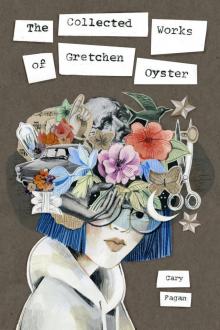 The Collected Works of Gretchen Oyster
The Collected Works of Gretchen Oyster Wolfie and Fly
Wolfie and Fly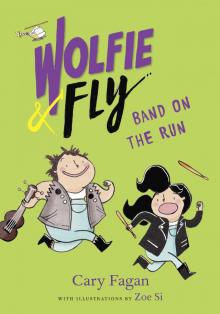 Band on the Run
Band on the Run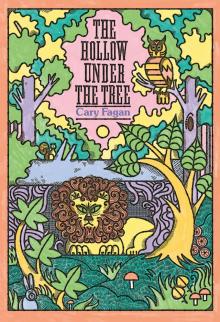 The Hollow under the Tree
The Hollow under the Tree Jacob Two-Two on the High Seas
Jacob Two-Two on the High Seas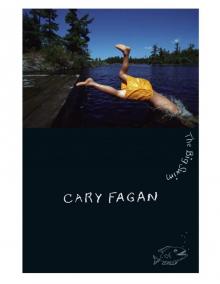 The Big Swim
The Big Swim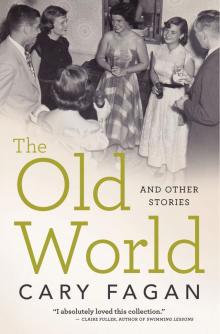 The Old World and Other Stories
The Old World and Other Stories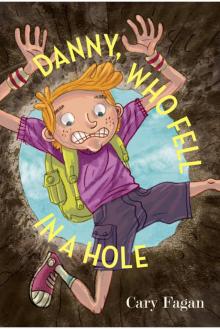 Danny, Who Fell in a Hole
Danny, Who Fell in a Hole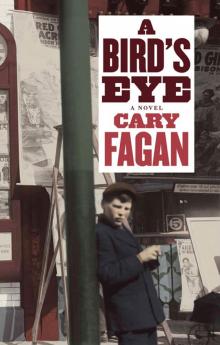 A Bird's Eye
A Bird's Eye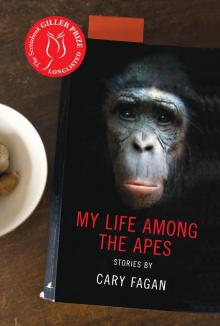 My Life Among the Apes
My Life Among the Apes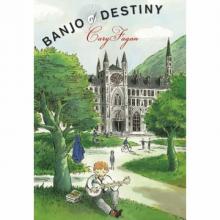 Banjo of Destiny
Banjo of Destiny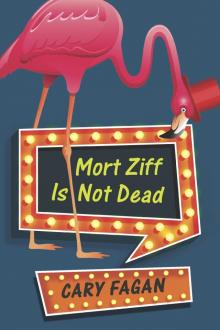 Mort Ziff Is Not Dead
Mort Ziff Is Not Dead